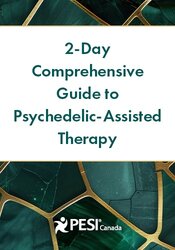
Trending Topics:
×

Psychedelic-assisted therapy has revealed remarkable outcomes for individuals wrestling with severe PTSD, anxiety, depression, and the lingering wounds of trauma.
Yet, alongside this promising potential, many clinicians remain unsure about safety, ethics, legality, and cultural considerations.
That’s precisely why this training is for you - to demystify psychedelic-assisted therapy through a rigorous, evidence-based, and culturally competent protocol. By joining our psychedelics expert, Kayla Breelove Carter, you’ll learn how to meet clients where they are at, reduce harm, accelerate healing, and offer trauma treatment safely and effectively.
Don’t let this rare PESI opportunity pass—this may be your one chance to revolutionize care for your hardest-to-treat clients.
NOTE: Tuition includes one free CE Certificate (participant will be able to print the certificate of completion after passing the online post-test (80% passing score) and completing the evaluation). Instructional methods will include PowerPoint, didactic lecture, and others.
Continuing Education Information: Listed below are the continuing education credit(s) currently available for this non-interactive self-study package. Program content is reviewed periodically per accrediting board rules for currency and appropriateness for credit. Credit approvals are subject to change. Please note, your licensing board dictates whether self-study is an acceptable form of continuing education, as well as which credit types are acceptable for continuing education hours. Please refer to your licensing board's rules and regulations. If your profession is not listed, please contact your licensing board to determine your continuing education requirements and check for reciprocal approval.
For other credit inquiries not specified below, please contact info@pesi.com or 800-844-8260 before purchase.
Materials that are included in this course may include interventions and modalities that are beyond the authorized practice of your profession. As a licensed professional, you are responsible for reviewing the scope of practice, including activities that are defined in law as beyond the boundaries of practice in accordance with and in compliance with your profession's standards.
For Planning Committee disclosures, please see the statement above. For speaker disclosures, please see the faculty biography.
Earn up to 12.0 CE hours. Please see below, for more details, as credit amounts vary by jurisdiction and profession.
PESI, Inc. is approved by the Canadian Counselling and Psychotherapy Association to offer continuing education for counsellors and psychotherapists. PESI, Inc. maintains responsibility for the program. This self-study activity is approved for 12.0 credit hours.
PESI, Inc. is approved by the Canadian Psychological Association to offer continuing education for psychologists. PESI, Inc. maintains responsibility for the program. This program is approved for 12.0 self-study continuing education hours. Full credit statement at: www.pesi.com/cpa-statement

PESI, Inc., #1062, is approved as an ACE provider to offer social work continuing education by the Association of Social Work Boards (ASWB) Approved Continuing Education (ACE) program. Regulatory boards are the final authority on courses accepted for continuing education credit. ACE provider approval period: January 27, 2026 - January 27, 2029. Social workers completing this course receive 11.5 Clinical continuing education credits.
Course Level: Intermediate Format: Recorded asynchronous distance. Full attendance is required; no partial credits will be offered for partial attendance.
Canadian Social Workers: Canadian provinces may accept activities offered by providers approved by the ASWB ACE program for ongoing professional development.
This self-study activity qualifies for 12.0 continuing education clock hours as required by many national and local licensing boards and professional organizations. Save your activity advertisement and certificate of completion, and contact your own board or organization for specific requirements.
| File type | File name | Number of pages | |
|---|---|---|---|
| Manual - 2-Day Comprehensive Guide to Psychedelic-Assisted Therapy (2.3 MB) | 78 Pages | Available after Purchase | |
| Manual - 2-Day Comprehensive Guide to Psychedelic-Assisted Therapy - French (2.3 MB) | 78 Pages | Available after Purchase | |
| Manual - 2-Day Comprehensive Guide to Psychedelic-Assisted Therapy - Italian (2.3 MB) | 78 Pages | Available after Purchase | |
| Manual - 2-Day Comprehensive Guide to Psychedelic-Assisted Therapy - German (2.3 MB) | 78 Pages | Available after Purchase | |
| Manual - 2-Day Comprehensive Guide to Psychedelic-Assisted Therapy - Spanish (2.3 MB) | 78 Pages | Available after Purchase |

Clinical Traumatologist Kayla Breelove Carter works with individuals and organizations to increase their awareness and understanding of trauma, racialized trauma, and adverse childhood experiences. Kayla helps bring reflection and profound change in one’s recovery journey, while guiding organizations in the reflection of how their privilege and own lens, can play out within their role in the workplace.
With over twelve years of clinical experience, Kayla specializes as well in nutritional psychology and psychedelic assisted therapy. As a clinical supervisor for those seeking licensing in New Brunswick and Nova Scotia, Kayla also dedicates her time in supporting graduate students through Breelove’s weekly free counselling clinic and community counselling program, where individuals seeking counselling therapy can engage in one-on-one mental health counselling for free.
Access never expires for this product.
Visit our FAQ page at https://www.pesicanada.ca/faq or contact us at https://www.pesicanada.ca/contact-us.
Foundations of Trauma and Trauma-Related Symptoms
Introduction to Psychedelic-Assisted Therapy
Cultural and Trauma-Informed Care
Psychedelic-Assisted Therapy in Practice
Ethical and Legal Considerations
| 5 |
|
| 4 |
|
| 3 |
|
| 2 |
|
| 1 |
|
Satisfaction Guarantee
Your satisfaction is our goal and our guarantee. Concerns should be addressed to info@pesicanada.com.
Please wait ...